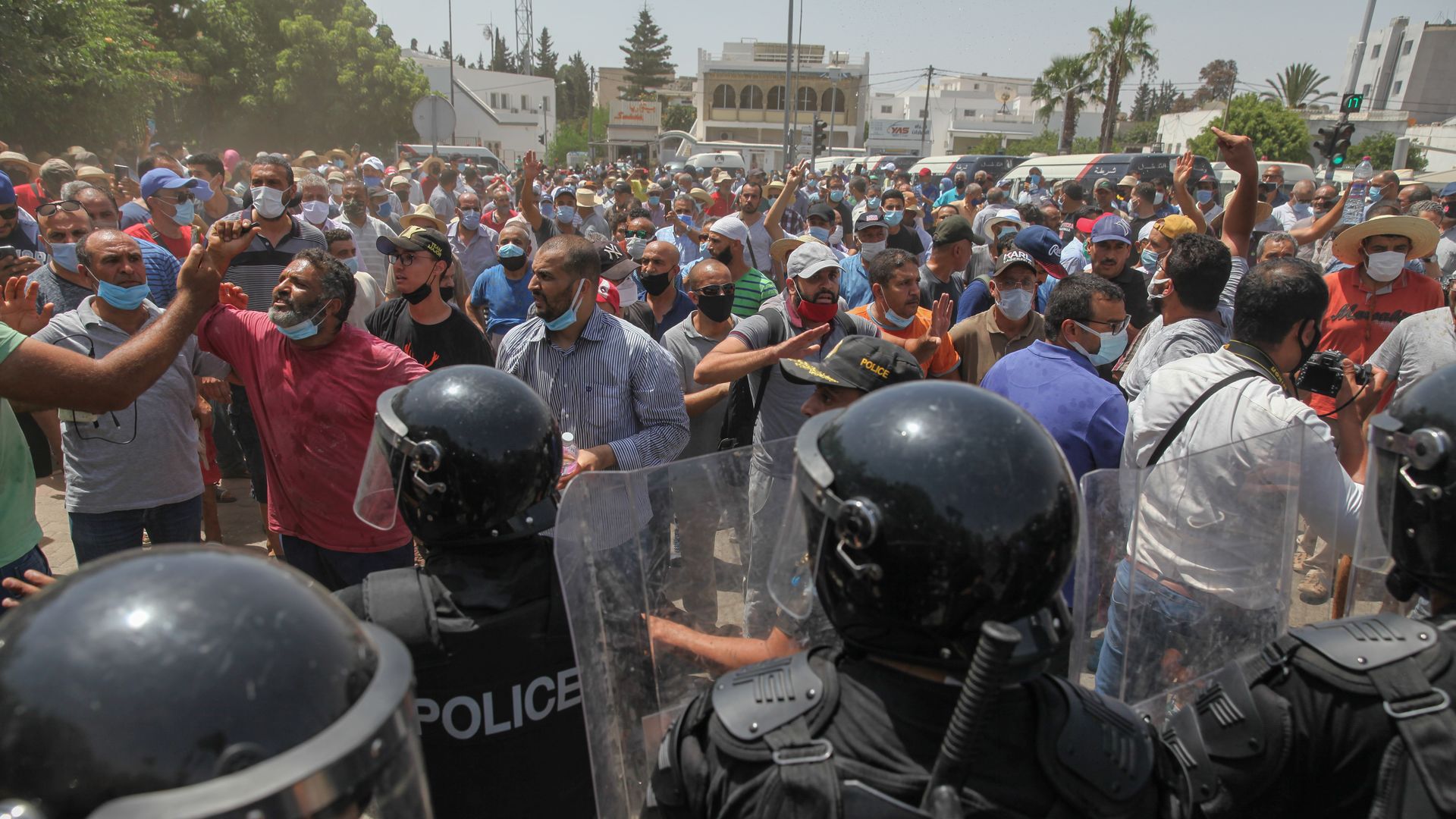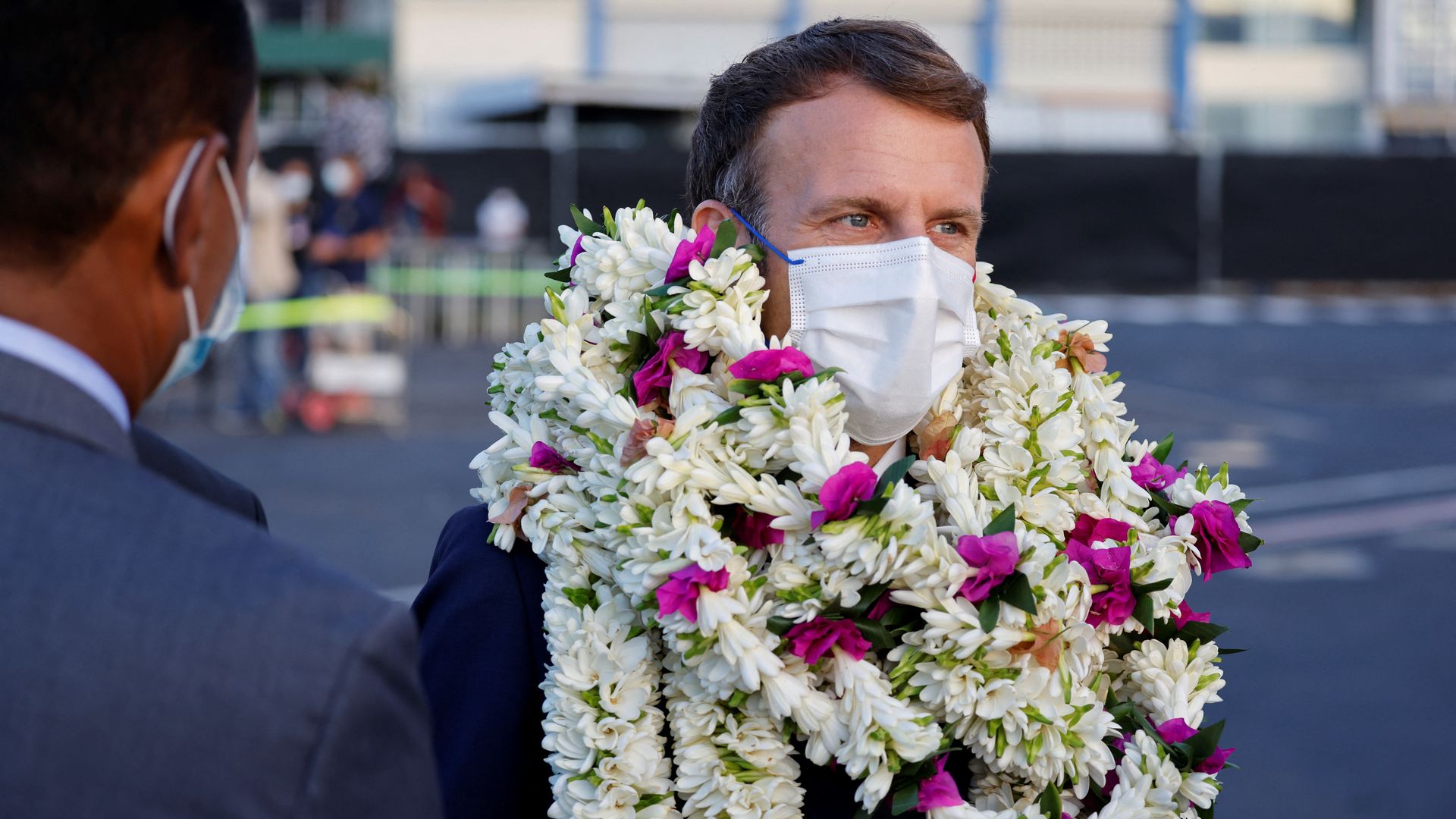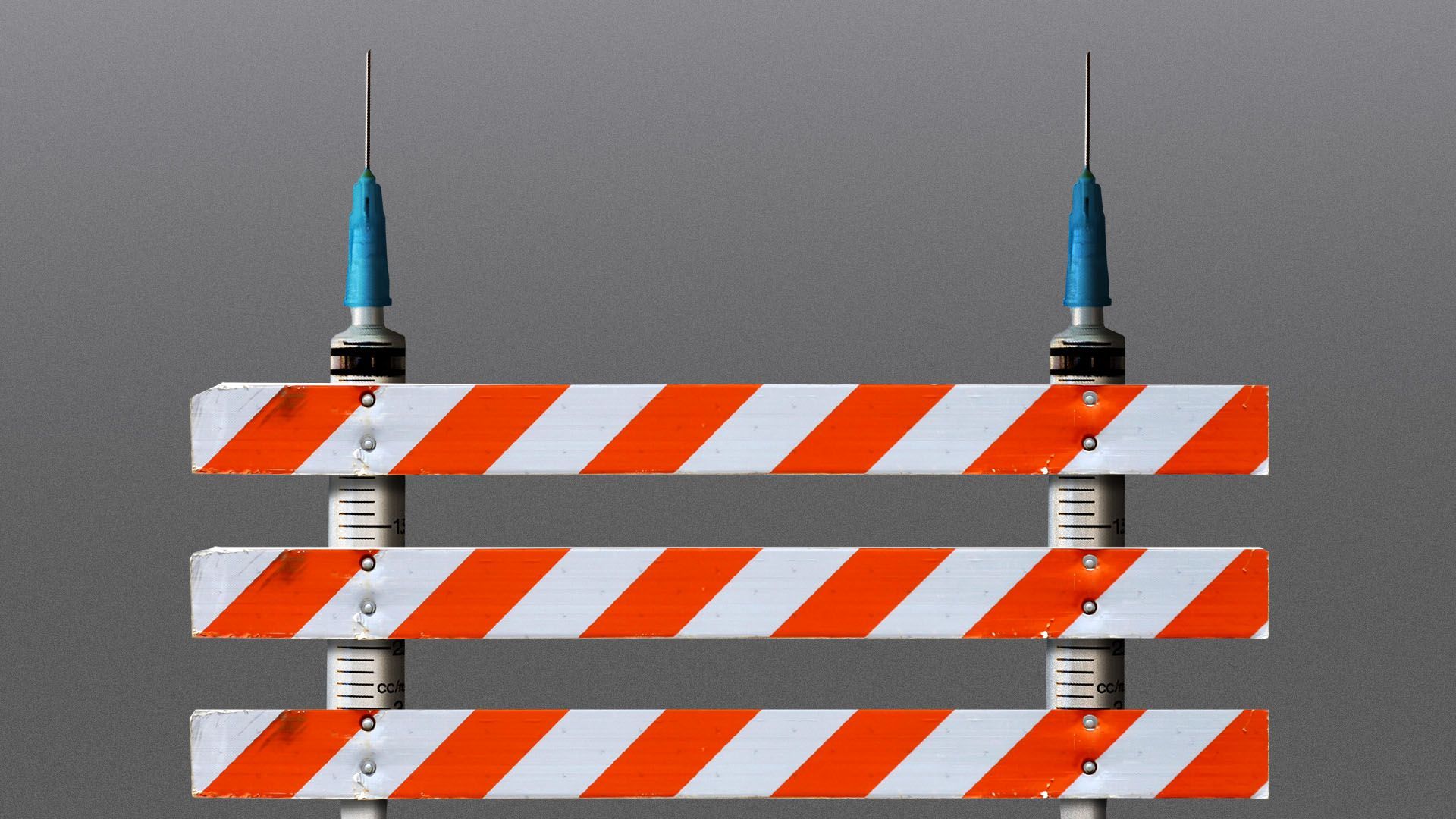| | | | | | | Presented By Babbel | | | | Axios World | | By Dave Lawler ·Jul 26, 2021 | | Welcome back to Axios World. - We're taking off tonight from Tunisia and making our way to Tokyo (1,965 words, 7½ minutes).
New arrival? Subscribe. | | | | | | 1 big thing: Tunisia's democratic experiment in danger |  | | | Supporters of the Ennahda party clash with police during a sit-in outside Parliament. Photo: Chedly Ben Ibrahim/NurPhoto via Getty | | | | Tunisia's decade-old democracy hangs in the balance after President Kais Saied removed the prime minister and suspended Parliament yesterday. Why it matters: Tunisia was the lone democracy to emerge from the Arab Spring, and remains the only democracy in the Arab world. But the country's politics have been deadlocked amid an economic crisis and its worst COVID-19 wave, leading to weeks of anti-government protests. Driving the news: Saied invoked a constitutional provision to claim emergency powers for the next 30 days and to dismiss Prime Minister Hichem Mechichi, after a monthslong power struggle. - He has said he'll name a new prime minister and has rejected claims that he's carrying out a coup.
- But, Parliament Speaker Rached Ghannouchi, who leads the moderate Islamist Ennahda party, staged a protest outside Parliament after being denied entry and urged Tunisians to resist this "return to dictatorship."
Between the lines: The initial reactions on the streets of Tunis seemed to be of jubilation, a sign of just how deep the frustration with the government had grown. - But others heard echoes of Egypt, where Abdel Fattah el-Sisi had ousted a democratically elected government in a 2013 coup.
Turkey rejected Saied's move while its regional rivals Saudi Arabia and Egypt offered tacit support. - The EU and U.S. have largely been in wait-and-see mode, declining thus far to call Saied's actions a "coup."
- The State Department stressed the need to protect democracy and expressed concern over reports that police had forcibly closed the local bureau of Al Jazeera.
The backstory: Saied, a political newcomer and constitutional law professor who won a shock election in 2019, has positioned himself as an outsider — a famously uncharismatic alternative to slicker political operators in Tunis, says Intissar Fakir, director of the Middle East Institute's North Africa and Sahel program. - With no political party and little unilateral power as president, he had been shielded from much of the anti-government anger.
But he had also been setting the stage for a power grab, says Sarah Yerkes, a Tunisia expert at the Carnegie Endowment. The protests provided "a good moment to take what could have been a very risky action." - "We don't really know what his endgame is. We don't know if he is just trying to reset the political situation and then will hand power back, or if he really is trying to become an authoritarian leader and take the reins of power," Yerkes says.
- She points to some of Saied's past comments, such as wanting to eliminate the role of prime minister, that make her suspect it's the latter.
What to watch: If Saied will quickly name a new prime minister and lay out a path forward or "slow walk it until it's the norm that he's in charge of everything," Yerkes says. - She adds that she'll also be watching the military's response, as Saied has threatened that the military will use lethal force if necessary in the event of violent unrest.
|     | | | | | | 2. Democratic discontent preceded protests, polls show |  | | | President Kais Saied during an appearance today. Photo: Anadolu Agency via Getty | | | | Before the protests and even before the pandemic, two-thirds of Tunisians were dissatisfied with the way democracy was working, per Pew. By the numbers: Trust in the government had fallen to 15% by March, according to polling from Arab Barometer. - 89% of Tunisians said corruption was prevalent in their country — tied with Lebanon for the highest among the seven countries sampled — and just 34% thought the government was working to address that corruption.
- The poll also underscores the depth of the economic crisis. One-quarter of Tunisians said they'd run out of food the previous month.
The big picture: Those findings challenge the narrative of a democratic success story. Tunisians still express pride at their revolution a decade later, but many think it has gone astray. - Still, the fact that the streets have been filled with protesters and independent media outlets are reporting on the latest developments are signs that democracy has taken root, Yerkes notes.
What to watch: "In the short term, this gives people the big, dramatic change that they want," Fakir says. "But is this really going to make it any easier for him to govern, saying nothing about the democratic process of course?" - "Once a country goes down this road — evoking this kind of emergency law, trying to get around the established political processes — it's very hard to pull the country back," she says.
Of note: Pew's survey of 1,045 adults was June 15 to July 11, 2019. Arab Barometer conducted their survey of 1,200 respondents on March 6-16, 2021. |     | | | | | | 3. Global news roundup |  | | | French President Emmanuel Macron is covered in garlands on a visit to Tahiti. Photo: Ludovic Marin/AFP via Getty | | | | 1. The U.S. combat mission against the Islamic State in Iraq will be completed "by the end of the year," President Biden said today while hosting Iraqi Prime Minister Mustafa al-Kadhimi, Axios' Jacob Knutson writes. - Biden is close to shifting the U.S. military mission in Iraq to a fully advisory role more than 18 years after combat troops were sent to the country under former President George W. Bush. About 2,500 troops remain in the country.
- Between the lines: The announcement may not change much in practice, but it's a political win for al-Kadhimi, who faces parliamentary elections in three months and is under pressure to push for a U.S. exit.
2. In Afghanistan, the U.S. has stepped up airstrikes to fend off a Taliban offensive against Kandahar — a highly symbolic target. The Taliban has been rapidly gaining ground but has yet to take a major city. - What to watch: Gen. Kenneth McKenzie, the head of U.S. Central Command, has declined to say whether the U.S. will end its airstrikes against the Taliban by Aug. 31, as previously indicated.
3. French President Emmanuel Macron is pushing for an investigation of the licensing of spyware from Israeli firm NSO to governments around the world amid reports that Morocco's security services may have used it to target his phone. - Why it matters: It's an uncomfortable moment for Morocco, which already feuded with Spain and Germany this year and counts France as its largest trading partner, the FT reports.
4. Deputy Secretary of State Wendy Sherman's visit to China took on a confrontational tone after her counterpart Xie Feng accused the U.S. of "a whole-of-government and whole-of-society campaign ... to bring China down," Axios' Zach Basu writes. 5. Sierra Leone abolished the death penalty — the 23rd country in Africa to take this stand, per Voice of America. |     | | | | | | A message from Babbel | | How Babbel trains your brain to learn a new language | | |  | | | | Unlike other apps that use machine learning to teach you languages, Babbel takes a human-based approach. What this means: Lessons are built by over 150 linguists and prepare you for situations you'll actually encounter in real-life. No random words or abstract grammar. Sign up and get 55% off. | | | | | | Bonus: Where in the World? |  | | | Screengrab via Apple Maps | | | | We're visiting an archipelago (red pin) that currently has the highest vaccination rate of any country on Earth, with 84% of the population fully vaccinated. Hint: To the left of your screen, you'll see a country that is featured prominently in this evening's newsletter. |     | | | | | | 4. What went wrong with the AstraZeneca shot? |  | | | Illustration: Sarah Grillo/Axios | | | | The world bet big on the Oxford/AstraZeneca vaccine. Flashback: By this time last year, the viral vector vaccine had emerged as a leading candidate, secured a production deal with the world's biggest vaccine manufacturer, and was being ordered in bulk at a low, not-for-profit price. - Over 3 billion doses of AstraZeneca have been purchased, more than any other vaccine. Many of those deals came early in the trial process, such as the 300 million doses purchased by the Trump administration.
- The WHO-backed COVAX initiative made the AstraZeneca shot the centerpiece of its effort to roll out vaccines all over the world.
Then things started to go wrong. - In the U.S. — where the shot still hasn't been authorized — regulators raised concerns about clinical trial data.
- In Europe, the initial issue was supply. Under pressure over slow rollouts, EU leaders lambasted AstraZeneca for delays and accused the company of prioritizing the U.K. Macron infamously claimed, without evidence, that the shot was "quasi-ineffective" in older people.
- Then came the safety concerns over blood clots. Countries in Europe and elsewhere suspended the vaccine. A few never resumed it, while others advised that it only be given to older people.
- By then, most rich countries were focusing on securing mRNA vaccines from Pfizer and Moderna. The AstraZeneca shot was poised to become the vaccine of the developing world.
Then came another supply crisis as India suspended exports during a brutal second wave, setting COVAX back by months and underlining just how dependent the initiative was on a single vaccine from a single producer, the Serum Institute of India. - Now, experts fear the controversy around the vaccine has increased vaccine hesitancy in Africa, where it is often the only shot available.
What I'm reading: Politico Europe's Jillian Deutsch and Ashleigh Furlo took a deep dive into what went wrong with AstraZeneca's shot, including an interview with Adam John Ritchie of the Oxford lab that developed the vaccine. - Ritchie told Politico he and his colleagues were feeling "broken." He lamented that it was the not-for-profit vaccine that had faced so much criticism: "Who is going to sign up to do nonprofit supply ever again?"
|     | | | | | | 5. Data du jour: Patriotism and the Olympics |  Data: Momentive; Chart: Danielle Alberti/Axios Americans who disagree on everything else will still be rallying around the same team in Tokyo, as a new Axios/Momentive poll makes clear. Yes, but: They're sharply divided over whether athletes should use the Olympic stage to protest, with young adults more likely than older adults to approve of protests and less likely to feel pride in the U.S. flag. - In addition, the race for medals could take on a Cold War flavor as a large number of Americans root against China.
What we're watching: Nearly one in four Americans (23%) say they'll be rooting against athletes from China. - There's a pretty big partisan split: 34% of Republicans will be rooting against them, compared to 16% of Democrats.
- Republicans are also far more likely than Democrats to root against athletes from Iran (34% vs. 14%), and somewhat more likely to root against Russian athletes (29% vs. 20%).
Americans are more likely to be cheering for neighbors and allies like Canada (39% for, 8% against), Mexico (30% for, 10% against), the U.K. (35% for, 8% against) and the hosts, Japan (27% for, 11% against). - In all cases, though, the most common response was "neither" for nor against, suggesting most Americans will be cheering for U.S. athletes and not against anyone.
Of note: See the polling methodology here. |     | | | | | | 6. The latest from Tokyo |  Data: Axios Research and International Olympic Committee; Chart: Connor Rothschild/Axios The U.S. has long been an Olympic power, competing with the USSR in the medal table throughout the latter part of the 20th century and now competing with China every four years. View the interactive chart Highlight of the weekend: Amid all the worrying news from Tunisia, there was also a historic victory. - 18-year-old swimmer Ahmed Hafnaoui barely qualified for the final but somehow managed to pull off an upset in the 400 meter freestyle, winning Tunisia's fifth-ever gold medal.
- "I just can't accept that — it is too incredible," a shocked Hafnaoui said after the race.
More headlines from Tokyo: Go deeper: Meet team USA |     | | | | | | 7. Stories we're watching |  | | | A nice night for some field hockey in Tokyo. Photo: Ina Fassbender/AFP via Getty | | | - COVID latest: Hanoi locks down; Israel expands vaccine passport; New Zealand pops travel bubble; U.S. buys more Pfizer; Moderna for EU teens
- Podcast: Pandemic exacerbates hunger crisis
- Billionaire named next Lebanese PM
- Barrack posts $250 million bail, pleads "not guilty" to illegal UAE lobbying
- Deadly monsoon in India
- Biden announces up to $100 million for Afghan refugees
- Argentina recognizes nonbinary people
Quoted: "It is not conceivable that in these times they want to punish an independent country with a blockade. I think that President Biden must make a decision about it." — Mexican President Andrés Manuel López Obrador today, pressing Biden to end the U.S. embargo of Cuba |     | | | | | | A message from Babbel | | The app that'll teach you a new language in 3 weeks | | |  | | | | Babbel makes it easy with bite-sized lessons, so you can spend less than 10 mins a day learning language skills you'll remember. In fact, 73% of users said they could have a simple conversation in their new language after just 5 hours of lessons. Sign up today and get 55% off one of 14 languages. | | | | Answer: Malta, with Tunisia to the west and Sicily to the north. |  | | It'll help you deliver employee communications more effectively. | | | | | | Axios thanks our partners for supporting our newsletters. If you're interested in advertising, learn more here.
Sponsorship has no influence on editorial content. Axios, 3100 Clarendon Blvd, Suite 1300, Arlington VA 22201 | | | You received this email because you signed up for newsletters from Axios.
Change your preferences or unsubscribe here. | | | Was this email forwarded to you?
Sign up now to get Axios in your inbox. | | | | Follow Axios on social media:    | | | | | |













No comments:
Post a Comment